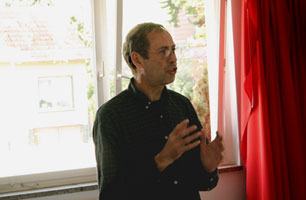
On Tuesday 6th May ECLA hosted Professor David Blackbourn as part of the Annual Conference on Water. Blackbourn’s lecture, entitled ‘Conquest and Conservation: German Waterlands since 1750’ drew largely on his recent book, The Conquest of Nature: Water, Landscape, and the Making of Modern Germany (2006), a broad-ranging and fascinating history of Germany’s ‘battle’ with ‘nature’ from the time of Frederick the Great.
Blackbourn was keen to point out the historicity of the concept of ‘nature’, and the fact that so-called ‘natural’ landscapes are rarely free from the influence of the shaping hand of man. He established the important distinction between nature and nature in itself, suggesting that the latter concept of a pure or untouched landscape was often confused with the former, the convenience of which belies extraordinarily complex processes of the interaction of humans with their surroundings. He was able to demonstrate this through his focus on the German case.
The leitmotiv in German rhetoric on nature, according to Blackbourn, is the ‘battleground’. Nature was something to be ‘conquered’, ‘civilised’ or ‘tamed’. To ‘defeat’ nature was a sign of human progress, an indicator of national greatness, and a maker of individual heroes. Blackbourn gave numerous examples, from the reclamation of land from marshes (to create more agricultural land), to the straightening of the Rhine (to prevent flooding and improve shipping), to the building of dams (to provide water and power, and to prevent flooding).
From these stories the political, social and cultural history of Germany emerges, since the vast undertakings of the ‘Conquest of Nature’ involved all the machinery of the modern state. The material landscape provides an entry point for understanding the German cultural past. For Blackbourn, it is not adequate to consider German cultural history entirely at the level of discourse, but instead to locate the ‘imagined community’ in very real spaces. Cultural and material aspects meet in Blackbourn’s work.
Of course, historical notions of progress, national greatness, and heroism often look, from the vantage point of history, like regression, hubris and arrogance respectively. Blackbourn wants to avoid the spurious balancing act required by those who would want to judge, by various value sets, the social, political and (perhaps most prominently) environmental consequences of the history of the German ‘battles’ with its water. There are empirical data showing the unintended effects (positive and negative) of these activities, but the interpretation of such data as ‘positive’ or ‘negative’ at different times precisely serves Blackbourn’s point that meanings derived from ‘nature’ and man’s place in it are historical. The changing of the German landscape tells us something about what it meant to be German; but what it meant to be German also helps us understand why the landscape changed.
David Blackbourn is Coolidge Professor of History at Harvard University, and Director of Harvard’s Center for European Studies. Besides the Conquest of Nature, he is the author of a number of books, including Marpingen: Apparitions of the Virgin Mary in Nineteenth-Century Germany (1994) and The Long Nineteenth Century: A History of Germany, 1780-1918 (1997).
Article by by Rob Boddice (faculty)
